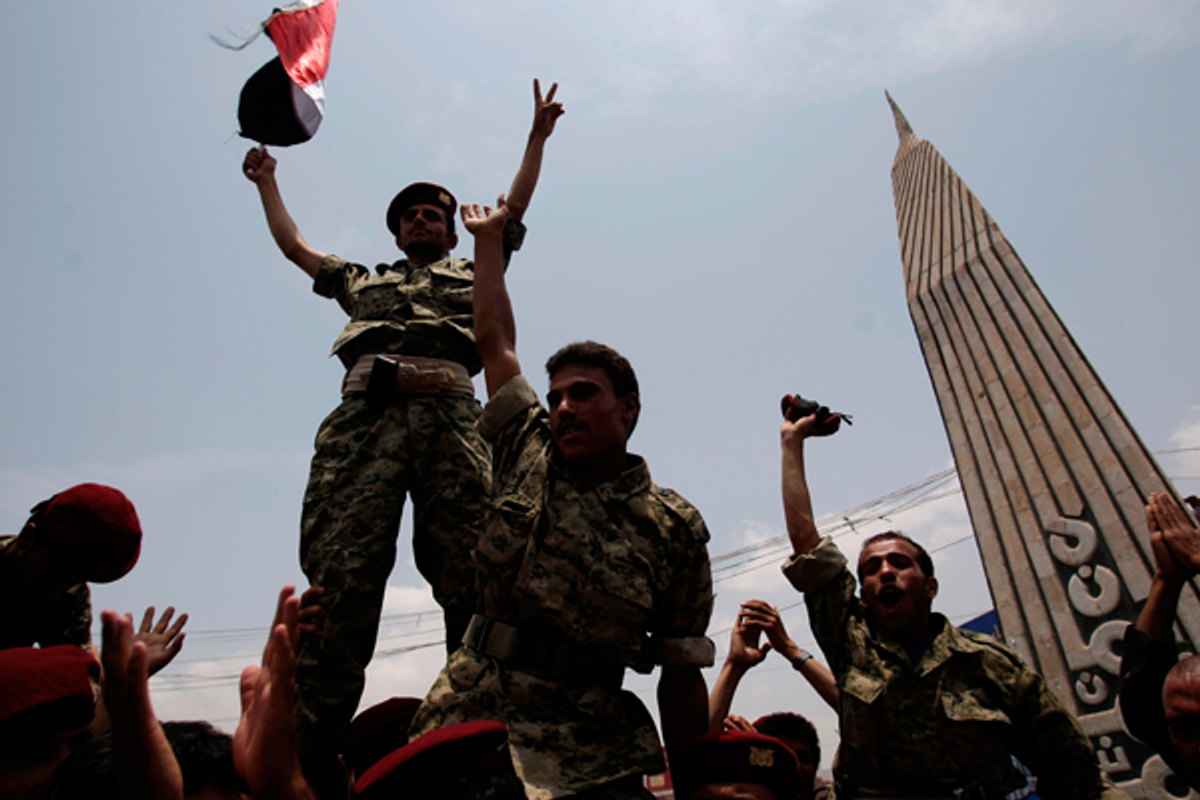SANAA, Yemen -- Remember Yemen?
 With Gadhafi on the run and Syria still at the height of its crackdown, it's easy to forget that protests are still going on in Yemen.
With Gadhafi on the run and Syria still at the height of its crackdown, it's easy to forget that protests are still going on in Yemen.
Probably because they aren't making much headway.
Thousands of Yemenis continue to stage anti-regime demonstrations and live in tent cities around the country, more than seven months after they first took to the streets demanding President Ali Abdullah Saleh's ouster.
But Saleh, while remaining in Saudi Arabia, is still the president of Yemen, and for the second time the ruling party has failed to agree on a power transfer to the vice president.
Protesters are growing increasingly frustrated with their lack of progress. Some, inspired by the fall of Tripoli and the triumph of the Libyan rebels, are even considering a more militant approach.
"We saw what happened in Libya and we felt sorry for ourselves," said Nader Abdullah, a protester working in the media center in Sanna's Change Square. "We said that our revolution would always be peaceful. This is a problem."
Such a sentiment seems to be growing in popularity.
"These are the finals days of our protest. Something has to happen now, we're so tired and frustrated," said Mohammad Hassan, a protester that has been living in Change Square for the past four months.
The Libyan Transitional National Council tri-color flag is a ubiquitous symbol in Change Square, and is painted on the sides of tents and buildings. Hundreds of protesters carry the flag during marches and demonstrations.
Protesters have begun calling for an escalation in marches across the country, perhaps hoping for a chance to confront loyalists forces head on.
Last Sunday, demonstrators grew angry with protest leaders after opposition coalition leaders succeeded in diverting a protest and containing it within a security cordon in Sanaa.
Remaining inside the cordon ensures that protesters won't confront loyalist forces.
"We need this!" said one protester, mimicking the firing of a machine gun with his hands.
As the march continued in a circle around the outskirts of Change Square, a small group of protesters took matters into their own hands. They broke off from the masses, and began moving towards the home of Vice President Abd Rabo Mansur Hadi, which is guarded by loyalists.
Four protesters were shot as the security forces opened fire on them.
Officials from the opposition coalition parties said they are determined to avoid further bloodshed and civil war.
The coalition's most powerful political party, Islah, is now largely in control of Change Square's day-to-day activities, which are being funded by Hamid Al-Ahmar, a billionaire businessman, tribal leader and leading Islah party figure.
But protesters are growing impatient with the opposition, which they see as preventing them from confronting loyalists and thus making any real progress on their demands.
Protesters were expecting clashes with security forces last Sunday as they moved out of Change Square, but several ambulances and medics showed up to escort them.
"We expected many deaths today," said one protester, Khalid Al-Awami.
"How are we going to pressure this regime without leaving Change Square? The [opposition coalition is] holding this revolution back in a cowardly attempt to save lives. For us to succeed, we must be willing to die."



Shares